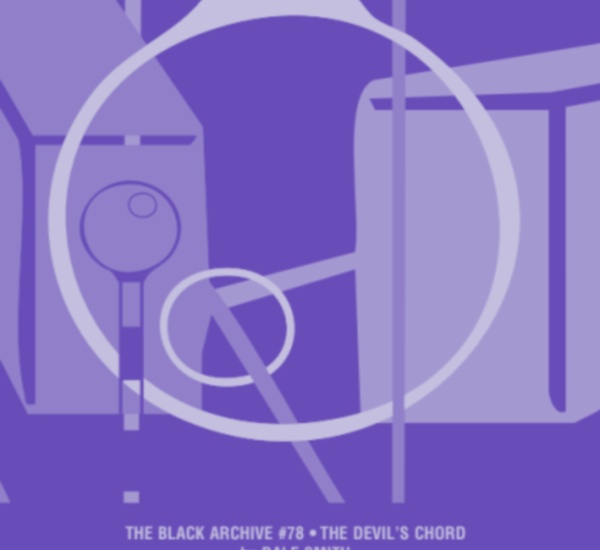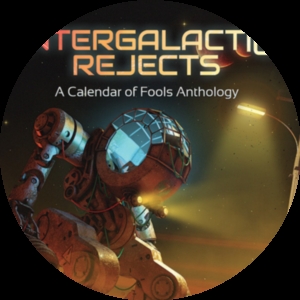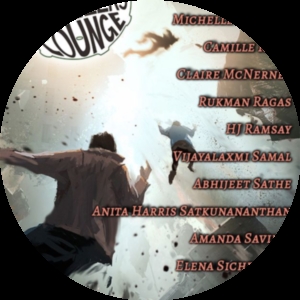Inspiration
I was out. I was so very nearly out.
When I submitted the final version of my Black Archive on Silence in the Library / Forest of the Dead, I thought it was going to be my last one. There are four different kinds of Black Archive: how was this made; what inspired this; what did it mean then; what does it mean now. All of mine have been combinations of the last three, but the main emphasis has been talking about how the story speaks to us now. That needs a certain kind of story to work: one that actually has a number of ideas in it that still speak to me, and come together to allow a coherent argument. It doesn’t have to be a story I like, but it does have to be one that inspires me to talk on a subject at length. Excepting one pitched Black Archive that was rejected for good reasons, when I finished talking about Stephen Moffat’s work on Doctor Who, there were no stories left that did that for me.
What I didn’t bank on was how quickly Russell T Davies would write one that did.
As soon as I watched The Devil’s Chord, I knew it was saying things about the sixties, the present day, artificial intelligence, post-modernism that I wanted to draw out at length. I immediately emailed Philip Purser-Hallard to see if anyone had already claimed it, and if not whether he’d be interested in seeing a pitch. He replied to say it was the shortest amount of time there had ever been between broadcast and a Black Archive pitch so how could he refuse?
The Pitch
Having got the OK to try, I needed to turn that initial enthusiasm into an actual outline of a Black Archive. This was complicated because - being so new - there was very little information about the story already available: at the time I was writing the pitch, everyone was very much in fluffy preview mode for the story, whereas for every other Black Archive I’ve written there has been at the very least a copy of Doctor Who: The Complete History that focuses on the story. This meant if I was going to use any details about the production side of the story, I was going to have to find them myself. But there was no guarantee that anyone involved in the production would talk to me, so I might be pitching something I couldn’t actually write.
My solution was to pitch Schrödinger’s Chapter One: it would exist, I explained, if I could get an interview with Russell T Davies to ask him about the writing, production and filming of the episode. If I couldn’t, my overstuffed Chapter Two would split in half and form its replacement. The reason my Chapter Two was so full of ideas was that it essentially covered the entire history of music, the Beatles, the history of England between the end of the Second World War and 1963, and also all the other times the Beatles had appeared in Doctor Who. On top of that, it also looked at John Higgs’ theory that the Beatles and the James Bond series of films essentially describe the two sides of the British psyche between the sixties right up to now, as detailed in his book Love and Let Die.
The other chapters were all fairly easy to come up with: a Doctor Who story dealing with music and the sixties so directly was the perfect place to talk about Delia Derbyshire and the Radiophonic Workshop; the line “I thought that was non-diegetic” is the culmination of the show’s long-standing engagement with post-modernism; and the cultural omnipresence of the Beatles is the perfect backdrop to talk about what Russell T Davies was doing with his second bite of the cherry, and what it means to be a fan of Doctor Who who doesn’t like a particular version of the show.
The pitch was duly bullet-pointed and sent to Philip and Stuart Douglas, and I waited to hear back.
Getting the Story
Philip and Stuart were both enthusiastic about the idea of the first Black Archive featuring Ncuti Gatwa’s Doctor, so it was pretty soon that I heard back I had been accepted. There was a slight issue though: in the meantime, Stuart had also commissioned me to write a novel based on Paradise Towers. He was worried this would delay one or the other, but the way I write a Black Archive requires a fairly heavy amount of background reading right at the start of the project: I told him I could write the Paradise Towers book whilst I was doing the research, and the two should hopefully fit around each other quite nicely. This was a slight exaggeration - I tend to write sections as I research them - but was essentially true: I prioritised my daily words for the Paradise Towers book, and then wrote about The Devil’s Chord if I needed to.
The main thing I needed to do first, though, was see who would speak to me. I have a very vague personal connection to Russell T Davies, and I made the mistake of thinking it would be best to approach him this way. I didn’t heard anything back though, and as I tried people in the Who world with more of a connection to him (but less of a connection to me) I discovered why that might be: Russell T Davies only responds to professional requests through his agent and can be understandably annoyed if people try to exploit his friendships instead. This was a very rookie error on my part - although in my defence one caused by several positive responses to contacting people via social media to ask about Doctor Who - and I don’t know how much it played into the response I later received from Davies’ agent saying he wouldn’t be available for an interview. Equally, there are plenty of other reasons why someone who was writing the third series of Doctor Who at the time might not be available to talk to somebody making an unlicensed book about one of his stories.
On top of that, I found myself stuck in a large rabbit hole trying to understand the various licensing arrangements that explained why the Beatles’ songs could be heard in the background of some 20th Century Doctor Who but apparently couldn’t be used in The Devil’s Chord without a huge amount of money being spent. I never quite managed to find someone who could give the definitive answer, but along the way conversations with James Cooray Smith, Mark Ayres, Andrew Hickey and - strangely - the High Court judge Sir David Andrew Foxton allowed me to get as close to the answer as I could without breaching some BBC confidentiality agreements.
Each new bit of information, each conversation with somebody else, each random insight that suddenly popped into my head, warped the structure of the book just a little. It had a shape it wanted to be, and it resisted the tight structure I’d tried to enforce on it. By the time I started writing it - to paraphrase Eric Morecambe - all the right thoughts were there, but not necessarily in the original order.
Writing the Story
I decided to take a different approach to the book, starting out as usual by writing paragraphs in roughly the right place as I finished bits of research, but then once I had the bulk of the paragraphs that were originally going to be the first two chapters, I did a bit of radical restructuring. The later chapters - each focussed on the one subject, more or less - stayed as they were, but the opening of the book changed almost beyond recognition from the original pitch. Most of what I’d hoped to write about the making of the story went out, obviously, but so too did sections talking about which Beatle was most like which Doctor and the song There’s Always a Twist at the End. These two at least could be salvaged and put in the appendices, now that they no longer fitted anywhere else, but the second chapter quietly morphed into something else: a longer discussion of everything I’d found out about copyright and the Beatles and an attempt to explain how they keep popping in and out of the soundtrack of Doctor Who.
The first chapter too became something else, still covering the broad strokes of the proposed first two chapters but with much more detail on how the 1950s paved the way for the cultural revolution of the 1960s, as well as mirroring the modern age. It became the longest chapter of the book, and took quite a while to get to actual Doctor Who; I knew it would probably require pruning, but all of it was relevant and at that point I couldn’t quite work out which bits could be passed over at speed.
But eventually, I had a finished first draft, with plenty of time for my deadline - the first I’d ever actually been given for a Black Archive, since usually the schedule is pretty full and I’ve been slotted in when somebody else had to delay or drop out. But that deadline turned out to be a bit of an issue: when we’d set it, the broadcast date for Season 2 hadn’t been set, but at is loomed closer it became obvious that I would be handing the book over to the editors just a few days after it had been broadcast. It seemed obvious there would be things in the season that would probably impact on what I was writing - although at that point I had no inclination that it would actually be the last of Ncuti Gatwa’s era and possibly of the second RTD era too. I checked with the editor’s that they were okay to get the first draft right on the deadline so I could accommodate any new details: fortunately they were, because the book in its original first draft would have looked very out of date.
Something else that happened, though, was less fortunate. When I’d pitched and written the first draft, I’d been completely taken with RTD’s return to the show: I’d worried that his return risked being a lap of honour that cemented the idea there were only really two writer-producers who could handle Doctor Who. But that series - with a bump at the end - convinced me that RTD was back to do something new, something ambitious and fantastically entertaining. But as I watched Season Two, all those old worries came back: probably because of the behind the scenes issues, suddenly the writing felt less confident and accomplished, more happy to lean back on things that had worked before and full of little niggles that felt like RTD hadn’t quite got the same command of his audience’s emotions. Frankly, I didn’t enjoy it half as much any more.
Going back to try and weave in bits of 2025 into that excited and optimistic appreciation of 2024 felt that much harder: I did my best to stay true to the spirit it had been written in, but reworking the final chapter - which addressed the issue of finding out that you weren’t a fan of Doctor Who any more - felt bitterly ironic now that it was talking to myself. But I got there, and I finished the draft.
Outside Help
With a finished draft, I took the opportunity to get some feedback from some great experts I had crossed paths with over the course of my life in Doctor Who: James Cooray Smith is the writer of the brilliant Psychic Paper (which I’ve had the great fortune to write for on a few occasions) and knows his stuff about Doctor Who, and fortunately copyright matters; Andrew Hickey is someone who has written for the Black Archives himself, but is now internationally famous for his fantastic A History of Rock Music in 500 Songs podcast. Both read over some of my work and very kindly and politely pointed out where I’d made some mistakes: as the old expression goes, any errors that remain are my own, but the things I got right are probably down to the help of these two.
Editorial
Handing in the (for simplicity let’s still call it) first draft just before the deadline, and it was all hands on deck. The first editorial came from Philip Purser-Hallard, who managed to read the whole thing over a weekend and made some salient points, including the need to clarify when we were talking about Cilla Black in the show and Cilla Black the person. He also, as expected, said the first chapter needed pruning and suggested that a section on the Suez Crisis could go. This was just the response I needed, because it immediately clarified for me that this was one of the key facts the reader needed to be aware of to understand how British society changed so rapidly in the 60s. So the section of Suez stayed, slightly tweaked, but now I knew that all of the detail around the development of the British nuclear deterrent was superfluous and all the reader really needed to know what that everyone from the Prime Minister down was well aware that a single bomb dropped in London would be the end of life in Britain as we know it, and that possibility was far from a remote one.
After that, the draft went to Stuart Douglas, who caught some further issues of clarity and confusion, and sent me off with some quick rewriting before the draft was finally accepted. We were all very happy with the book as the last weekend before it went to print arrived, when it was suddenly announced that Doctor Who had earned its very first Emmy nomination … and it was for the dance sequence I discuss at length in the book from The Devil’s Chord. A bit of hasty rewriting to acknowledge this, and finally the book went happily off to the printers.
What Happened Next
What happened next is a bit up in the air, I suppose. The book is now available to buy. I’ve enjoyed writing every one of my Black Archives, but it’s been a pretty long run and I have to say I’m looking forward to reading some books that aren’t related to Doctor Who for a little while. I won’t say I’m definitely done with the range - if nothing else, there’s always the chance that a new story will come along that I have to write about - but four books seems like a nice round number, and I do think that if I come back to do another one I definitely want it to be a different kind of book. Writing around a subject is interesting, and has pulled out some interesting bits of stories, but it also means all of my Black Archives go off at an angle from their stories, and only remain tangentially connected. The last two books I’ve wanted to interview somebody involved in the making of the show and hopefully uncover something that hasn’t been said before. Both times I’ve failed.
But still: there’s always a twist at the end.


